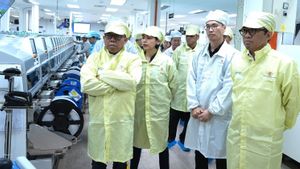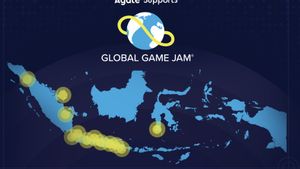JAKARTA - The government is considered to need to strengthen the absorption of real sector workers. Especially in the midst of the era of digitalization.
Institute for Development of Economics and Finance (Indef) senior economist Aviliani said, amid the digitalization trend, the work pattern has changed and digitization has become a common thing.
"Now what we see is layoffs (termination of employment) for employees is not due to economic impact but more because of digitalization," said Aviliani quoting Antara, Thursday, March 2.
Therefore, he continued, increasing the ability of Indonesian human resources to be able to respond quickly according to current and future labor needs is important.
"The government's job is how to make policies in the future, which are linked to the absorption of workers based on the real sector," he said.
In addition, he said that investment entering Indonesia is expected to drive industries that absorb more labor, such as labor-intensive industries and employ domestic workers.
On the other hand, empowerment, especially for the lower middle class, also needs to be improved to improve its economy so that it can reduce socio-economic inequality.
"Indeed, what must be overcome is the gap because growth can be high, but what contributes to growth is more in the upper middle class, now what is below is indeed after BLT (direct cash assistance) then how empowerment becomes important," he said.
Aviliani hopes that Indonesia's economic growth, which is expected to continue in the future, can be followed by a lower gap. He predicts that Indonesia's economy in 2023 will grow in the range of 4.8 to 5.1 percent.
In addition, according to him, it is unlikely that Indonesia will experience a recession in 2023 because after the lifting of the Implementation of Community Activity Restrictions (PPKM), domestic demand tends to increase. Even predictions from international institutions, Indonesia, including developing countries, can grow in the range of 4-5 percent.
"We see that the recession may be that the percentage in Indonesia is very small, it is only possible that there will be a decline in growth, so if we look at 2023, the economic recovery will certainly continue," he said.
The Central Statistics Agency (BPS) reported that the Indonesian economy in 2022 managed to grow 5.31 percent compared to the previous year (year-on-year/yoy), higher than the achievement in 2021 which experienced growth of 3.70 percent.
Previously, research on "Digital Asia Pacific Expert: Economic Benefits of Technology Literacy" commissioned by Amazon Web Services (AWS), an Amazon.com company, and implemented by Gallup, researched how efforts to build a technology-backed workforce have brought significant benefits to workers, organizations/companies, and the economy.
The research was conducted on 1,412 adult workers and 348 employers in Indonesia from various public and private and industrial sector organizations.
The research found that digital workers with high level skills in Indonesia not only enjoyed greater income.
As many as 88 percent of workers in the group stated a higher level of job satisfaction, compared to 49 percent of workers with medium skills and 44 percent of workers with basic digital skills.
The English, Chinese, Japanese, Arabic, and French versions are automatically generated by the AI. So there may still be inaccuracies in translating, please always see Indonesian as our main language. (system supported by DigitalSiber.id)













